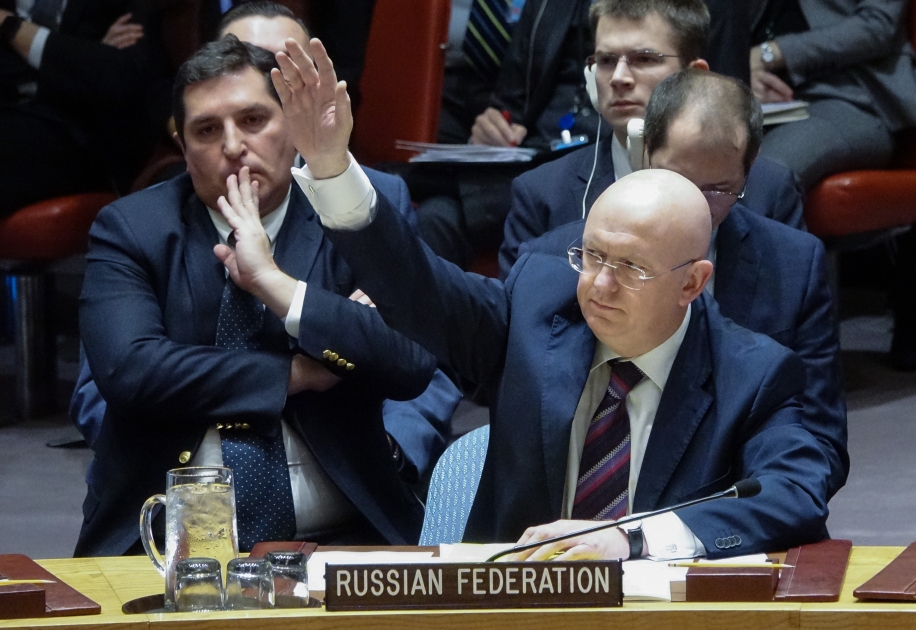Statement by Ambassador Vassily A. Nebenzia, Permanent Representative of the Russian Federation to the United Nations, at the Security Council after the vote on the American draft resolution on the Joint Investigation Mechanism mandate in Syria
As we all know, the Russian Federation was unable to support the draft resolution (S/2017/962) submitted by the United States delegation.
Today we have been told that we refused to engage in consultations or to communicate. That is not so, since our experts did indeed communicate whenever they were reached out to.
Over the past few weeks, we have patiently explained that we cannot take the proposed concept seriously. It was wrong from the start in that it was geared towards entrenching the systemic flaws in the work of the Organization for the Prohibition of Chemical WeaponsUnited Nations Joint Investigative Mechanism as well as that of the Fact-finding Mission of the Organization for the Prohibition of Chemical Weapons (OPCW) in the Syrian Arab Republic.
Today’s statement by the Permanent Representative of the United States was focused not on the Mechanism but, as usual, on Russia. Clearly, we will also be hearing repeated accusations of Russia in interviews and press releases.
Today my British colleague referred to — even, one might say, blurted out and betrayed, and I am very grateful to him for his frankness — the main point that this spectacle was conceived and based on.
The Permanent Representative of the United Kingdom said that there is no place for Russia in the political process in Syria. There we are. That is why this whole unscrupulous performance was devised, to cast doubt on Russia’s role in the political process for resolving the Syrian crisis. I would like to thank Mr. Rycroft for saying out loud what many could not bring themselves to do.
There was nothing balanced about the United States draft resolution. The main emphases in the text remained the same throughout the expert discussions. The changes made were merely cosmetic and did not deal with a single one of the flaws in the bodies investigating the Syrian chemical weapons dossier.
We would like to remind our United States colleagues — and those who were not interested in examining the details when they supported the draft resolution, divorced from reality, submitted by the United States — that it is they who will bear the burden of responsibility if the Mechanism cannot be preserved. Russia is doing everything it can to prevent that from happening.
It had appeared that we were united by one goal — extending the Mechanism’s mandate and increasing its effectiveness in the interests of identifying the real perpetrators of chemical weapon crimes. It turns out, however, that some of our partners in the Security Council have other priorities.
From a historical perspective, many have now observed that the endless distortions regarding Damascus and chemical weapons, which were in fact removed and destroyed under OPCW oversight, are strongly reminiscent of the situation in Iraq almost 15 years ago. At the time, the representatives of the United States deliberately misled the international community, including the Security Council, in order to establish grounds for the intervention that ultimately resulted in immeasurable misery for Iraq and the entire region.
In his recently published memoir, Gordon Brown, former United Kingdom Prime Minister, openly discusses the dubious nature of the arguments supporting the military campaign launched against Iraq in 2003. As it turns out, the United States deliberately concealed from its closest allies the conclusions of its military specialists, who had been unable to establish any credible traces of Iraqi activity linked to weapons of mass destruction.
This is not the first statesperson and will probably not be the last who over time has a stroke of insight or epiphany in relation to the mosntrous experiments in Iraq and Libya. Will this geopolitical laboratory never shut down?
Russia, which has always unconditionally supported the international regime on the non-proliferation of weapons of mass destruction, has proposed, not for the first time but so far without success, together with its Chinese partners, that the Security Council should tackle the issue of chemical terrorism in the Middle East seriously.
Last year, at the Conference on Disarmament in Geneva, our Foreign Minister Sergey Lavrov proposed drafting an international convention to combat acts of chemical and biological terrorism. We call on everyone to join the discussions on the issue. Any delay on it could be very costly.
In conclusion, I would like to support my Bolivian colleague’s proposal to resubmit draft resolution S/2017/933. We would like to be a co-sponsor of the draft resolution and propose that it be put it to the vote today.
